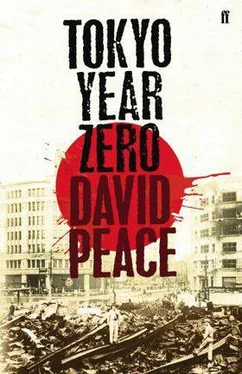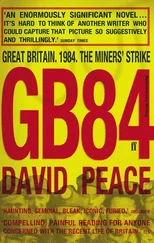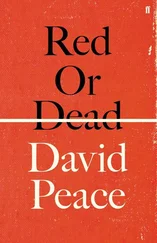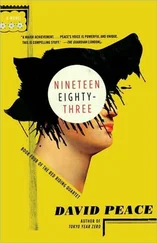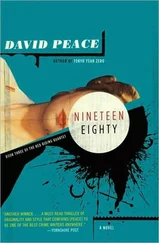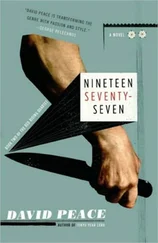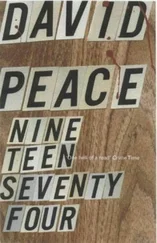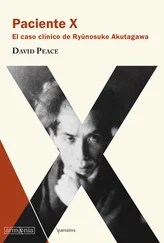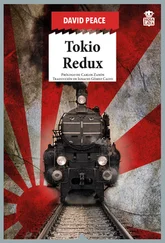A century of change in one night of fire…
Fires unfolding like fans, burning buildings, boiling rivers, bodies suffocated by smoke, scorched by flames –
I smelt them then. I smell them now –
That stench of rotten apricots…
Now I walk away from the Matsuya Department Store, towards the Niten Shinto Gate, onto the empty black square where the great Kannon Temple once stood, past hundreds of tiny stalls, trumpets and saxophones wailing from amplified loudspeakers –
Ton-ton. Ton-ton. Ton-ton. Ton-ton. Ton-ton…
I make my way through the old clothes market, I push my way through the crowds, and I come to a row of food stalls wedged together by the side of the Asakusa Pond, the air here thick with the smell of burning oil. I stop to drink among the old soldiers –
Ton-ton. Ton-ton. Ton-ton. Ton-ton…
I stare out at the billboard advertisements –
Ton-ton. Ton-ton. Ton-ton…
For the restaurants and revues –
Ton-ton. Ton-ton…
Movies and musicals –
Ton-ton…
The sun falling in black and white lines through the bamboo roof, I stare out into the face of a young boy, caked black in rags and filth, his face and hands covered in blisters and boils, he weeps pus and tears, now he raises his hand and he points his finger –
Ton-ton. Ton-ton. Ton-ton. Ton-ton…
Hammering then, hammering now –
Masaki, Banzai! Daddy, Banzai!
The hammering never stops –
Ton-ton. Ton-ton. Ton-ton…
*
I put my daughter on my back again and I carry her home through the mulberry fields, back towards our house but then, when we get to an old well, I put her down. I take out my handkerchief. I wash and soak it in the well. I wring it out. Then I put it over my daughter’s eyes –
‘Just until the smoke has gone,’ I tell her.
I put my daughter on my back again and I carry her home, through the gate and up the path to the door and the genkan —
‘We’re home,’ my daughter and I shout together.
I fetch some water and I go back out into the garden. I pour the water onto the flames and I put out the bonfire of bedding –
‘The smoke irritates her eyes,’ I tell my wife.
My wife bows down. My wife apologizes –
‘Don’t,’ I tell her. ‘You had no choice.’
My wife bows again. My wife thanks me again. My wife says, ‘I am very sorry you had to take her to the hospital. You must be tired now. I have made you some breakfast…’
‘Not now,’ I say. ‘There are some things I must tell you…’
‘Daddy’s going away again,’ sings my daughter.
My wife begins to scold my daughter –
‘Sonoko is right,’ I tell my wife. ‘But I am going away because I have been demoted. I have lost my command and I have lost my rank. I have been ordered to go to Tochigi Prefecture as part of the present investigation. However, it is only for a few days and I would hope to be back by Tuesday or Wednesday. But, when I return, I will then be transferred to a local police station and I don’t know where that will be or for how long –
‘I have been told that the Public Safety Division of GHQ has been asking questions about my previous record and career, about my suitability as a police officer. It is possible that my name will appear on the next Purge Directive. It is certain that this will mean dismissal. It is also possible that this might even mean a trial and imprisonment. Even execution…’
Now I bow low. ‘I am truly sorry to have to tell you this…’
My wife bows deeply too, her shoulders shaking, her tears falling on the tatami, and she sobs, ‘I am sorry. This is all my fault.’
‘The fault is mine,’ I tell her. ‘Don’t reproach yourself…’
‘I am sorry,’ she sobs again. ‘I have been a poor wife…’
‘Please don’t cry,’ I ask her. ‘And please don’t reproach yourself any further. You have looked after our children and you have maintained our house under difficult circumstances. We continue to face a difficult and uncertain future and so we must both be strong for our children. We must both try our very hardest…’
My wife nods her head. My wife bows her head.
‘Did you get the money out of the post office?’
‘We’ve queued every day, but still nothing…’
I take out an envelope from my jacket pocket. I tell her, ‘There’s some food in my backpack, some rice and some vegetables, and this money will be enough until I get back.’
My wife bows. My wife thanks me –
We are both on our knees –
Get off your knees!
I get up from my knees. I walk through to the other room where our butsudan alcove is. I kneel down before our butsudan , before the photographs of her parents and mine, her sister and my brother. I lean forward on my knees to light three sticks of incense. I tap the metal bowl three times. I kneel back down before the altar –
Now I pray to my father, my mother and my brother –
To apologize for my behaviour and for my failings –
To beg for their forgiveness and their guidance –
To ask for their help and for their protection –
I lean forward on my knees again. I place the envelope of money on the butsudan . I place the bag of food before the altar –
The air is heavy with the smell of incense –
The smell of smouldering bedding –
My eyes sting. My eyes smart…
The smell of DDT –
My own tears .
*
I am late now and the Asakusa station is crowded, dark and hot. Every station . Hundreds, maybe thousands of passengers in queues for tickets which take hours, even days to get, tickets for trains which take hours, even days to arrive. Every station, every train . The whole of Japan, the survivors, the lucky ones , on the move, on the move –
I look to the left and to the right. In front then behind me –
No men from Headquarters. No men in uniforms…
I push my way through the crowds. I push my way up the stairs to the second floor, towards the platforms and the trains –
I look to the left and to the right. Behind me then –
I see Ishida up ahead. Ishida at the ticket gate –
Does he know they found Detective Fujita?
Ishida bows. Ishida hands me my ticket –
Does he know? Does he care…?
I hurry us along. We show our train tickets and our police notebooks at the gate. Quick! We walk briskly along the platform. We pass the long string of run-down third-class carriages for the unprivileged Losers. Quick! We come to the second-class hard-seat carriage, reserved for the privileged Losers like us, our carriage –
Quick! Quick! Quick! Quick! Quick!
I glance back down the platform –
No one chasing after us…
Ishida and I board the train –
No one here waiting…
The conductor has kept two seats for us opposite each other; Ishida facing back towards the third-class carriages where the passengers are packed in, sitting, standing and hanging off the steps while I am facing forward to the Victors’ carriage, the two reserved carriages for Victors Only which, for once, are full of GIs returning to their Tochigi postings from leave in Tokyo –
The whistle blows…
A conductor in a shabby brown Tōbu uniform stands guard on the connecting door to the first of the Victors’ carriages, a steady stream of Japanese people still trying to steal a seat through there –
Each time the conductor in his shabby suit stops them –
The locomotive starts to move. The wheels start to turn…
Читать дальше
